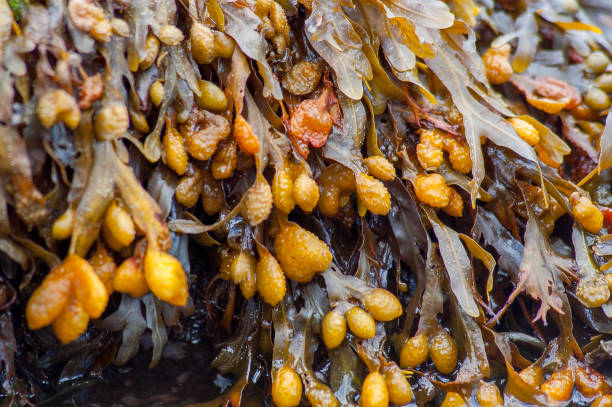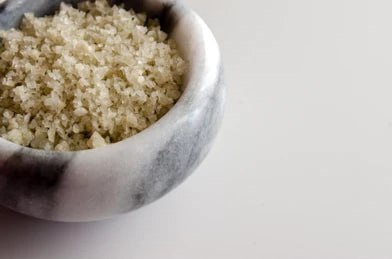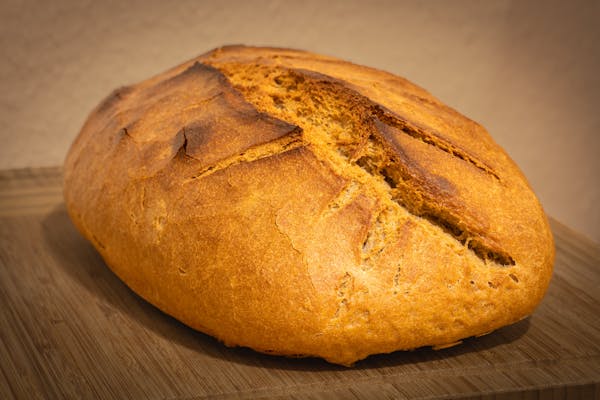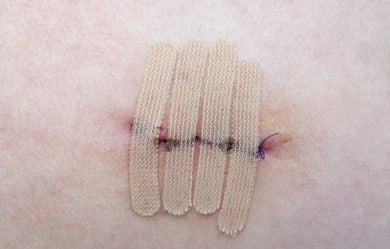
Related products
Fucus vesiculosus, more commonly known as bladderwrack, enjoys considerable recognition in the global health and wellness sphere courtesy of its remarkable traits and healing properties. This species of seaweed mainly flourishes along the shores of the North Sea, and western Baltic Sea along with Atlantic & Pacific Oceans underlining its broad geographical distribution.
Acknowledged as one of nature's treasures from sea depths, bladderwrack is a brown algae notable for distinctive air-filled bladders that enable it to float above seawater surfaces. These shoots have long been exploited by various cultures for nutritional value while their medicinal attributes are gaining increasing attention globally.
Its prominence arises primarily out of varied bioactive compounds within - notably iodine essential for thyroid function; polysaccharides like fucoidan believed to possess anti-inflammatory properties; fucoxanthin – an antioxidant with potential weight loss-related benefits amongst others.
In contemporary times when lifestyle diseases increasingly influence human well-being, focus on more organic treatments has heightened among individuals seeking alternatives or adjuncts to traditional medicine. In such context lies bladderwrack’s relevance today as research validating these uses continues unabated.
What is Bladderwrack?

Bladderwrack, known scientifically as Fucus vesiculosus and commonly referred to as black tang or rockweed, is a seaweed species that belongs to the brown algae family. The plant's naming can be attributed predominantly to its appearance - distinctive for air-inflated sacs called bladders along the strand’s middle.
This marine flora presents a complex morphology characterized by branching fronds ranging from greenish-brown in color during summer months transitioning towards darker hues when exposed to colder conditions. These branches often bear receptacles housing reproductive cells under small bump-like protrusions boasting noticeable bladders filled with gas aiding in buoyancy over ocean surfaces.
Famed for extensive geographical distribution, Bladderwrack thrives suitably within North Sea coastlines while being similarly widespread across the Atlantic & Pacific Oceans. An intriguing aspect worth noting lies in bladderwrack's predilection towards certain environmental settings namely rocky shores plus tidal pools thereby seen regularly attached upon stones providing firm base anchoring via holdfast organ on the lower end.
Nutritional Profile
Bladderwrack, a maritime marvel, boasts an abundance of vital nutrients. It is noted for its substantial iodine content which has been associated with endorsing robust thyroid performance. Among other minerals it houses are calcium and magnesium - instrumental in fortifying bones and enabling smooth nerve signals along with muscle movements respectively.
A noteworthy aspect of this marine alga lies in its potassium content that works conjunctly with sodium to maintain fluid balance contributing positively towards heart health. Complementing these mineral deposits are Vitamins A & C offering benefits ranging from enhancing vision integrity to skin health improvement through antioxidant activity protecting against cell damage alongside immune system support.
Health Benefits

Thyroid Health and Iodine Content
The iodine found in bladderwrack is instrumental for thyroid health as it aids the synthesis of two fundamental hormones - thyroxine (T4) and triiodothyronine(T3). These hormones govern essential bodily processes, including metabolic activities, maturation phases, expansion progressions and generation of energy required by the human body.Dr.Eric Wood, a renowned naturopathic doctor affirms that often individuals suffering from conditions like hypothyroidism benefit considerably from moderate Bladderwrack intake.
Antioxidant Properties
Predominantly being a rich source of fucoxanthin - an antioxidant-carotenoid compound - bladderwrack has inherent capabilities to neutralize harmful free radicals in our bodies thus delaying cellular aging suggesting its potential utility in lessening oxidative stress-related disorders.
Potential Anti-inflammatory Effects
Fucoidans present abundantly inside this seaweed draw attention due to their anti-inflammatory properties implying beneficial effects against numerous inflammation-triggered diseases including arthritis or even certain cancers hence indicating far-reaching therapeutic implications.
Skin Health Benefits
Last but not least important fact lies skin related benefits offered through both external applications oral consumption products containing Fucus vesiculosus With nutrient-rich composition boasting an array of minerals and vitamins besides antioxidants present considerable advantages skincare industry Products utilizing these extracts provide effective solutions to ailments ranging from acne eczema owing natural moisturizing plus cell-regeneration abilities.
Applications and Uses
Culinary Uses
Bladderwrack is a highly valued culinary ingredient, particularly in coastal areas where it routinely features in traditional recipes. Due to its uniquely mild salty flavor and nutrient-rich profile, Bladderwrack often finds utilization as a garnish over salads while being added to soups or broths for an extra depth of flavor. Particular dishes gaining popularity include Atlantic seaweed salad and flavored powders used as salt substitutes.
Medicinal & Supplement Uses
From centuries-old herbal remedies to modern dietary supplements - the medicinal use of bladderwrack has been widespread due largely attributable to iodine content benefited thyroid health patients suffering conditions like hypothyroidism.
Moreover, commercially available capsules tablets tinctures are commonly marketed to help weight loss reduce inflammation enhance digestive health among other benefits even though solid scientific evidence regarding the efficacy of these claims remains under exploration.
Cosmetic & Skincare uses
When speaking about cosmetic applications, bladderwrack holds remarkable relevance in the contemporary skincare industry recognized for profound hydrating properties and beneficial impacts on skin elasticity. It is also confirmed that alga extract's ability to improve collagen synthesis thereby reducing signs of aging. Various cosmetics manufacturers incorporate this marine product into creams, lotions, face masks serums attributing antioxidant capabilities aiding the fight against free radicals keeping complexion radiant and healthy.
Potential Risks and Precautions
Bladderwrack, though plentiful in nutrition as discussed earlier, must be considered with a degree of caution since excessive intake has been associated with certain health risks. High levels of iodine found naturally within it might lead to thyroid dysfunction for some individuals if taken overly. Its consumption needs monitoring by those already diagnosed with thyroid disorders including hyperthyroidism or hypothyroidism; balancing such high iodine content becomes pivotal under medical supervision.
Side effects reported range from skin sensitivities (like rash), and stomach upset to more serious issues like kidney failure when consumed recklessly over prolonged periods without adequate guidance from healthcare providers. The Food & Drug Administration’s guidelines highlight that pregnant women and nursing mothers ought to tread carefully while considering bladderwrack use given limited available research concerning safety implications during these specific physiological stages.
Recommended dosages rely on variables such as age, overall health status plus individual medical history hence rendering blanket recommendations impractical thus necessitating personalized dose adjustments verified via qualified professionals ensuring the right balance between optimal benefit against minimal risk is maintained at all times.
Bottomline
Bladderwrack, also known as Fucus vesiculosus or black tang, is a brown algae marked by its unique appearance and bioactive components. Found across various marine habitats globally but favoring rocky shores and tidal pools of the North Sea, Atlantic & Pacific Oceans; it has carved out an important place in both nutrition and potential therapeutic benefits.
Its nutrient profile includes impressive amounts of iodine along with other essential minerals such as calcium, magnesium plus vitamins instrumental for overall health maintenance. Despite these offerings though - consumption warrants certain precautions due to possible adverse effects particularly concerning individuals with thyroid conditions besides pregnant women and nursing mothers where optimal dosages must be individually tailored under professional supervision to minimize associated risks.
Frequently Asked Questions
What is a bladderwrack good for?
Bladderwrack serves a multitude of purposes, notably in the nutritional and health supplement industry due to its rich iodine content. It aids thyroid function, and weight loss efforts and offers anti-inflammatory properties besides potential antioxidant benefits.
What are the side effects of bladderwrack?
Bladderwrack has side effects related primarily to excessive intake which include issues like skin rash, stomach upset, or even severe cases like kidney failure particularly with prolonged reckless use without proper medical supervision. Those diagnosed with thyroid disorders need extra caution considering high iodine levels within it.
What is bladderwrack also known as?
The seaweed is commonly known as black tang or rockweed besides bearing the official scientific title Fucus vesiculosus.
What is the difference between seaweed and bladderwrack?
While all types of bladderwrack are technically classified under the broader umbrella term "seaweed", not every kind of seaweed qualifies as bladderwrack. Seaweeds cover varied species from different families characterized by unique attributes; Bladderwracks represent one such specific variety identified for their distinct appearance displaying air-filled bladders that help them float over water surfaces among other notable features exclusive to this type alone.
Does bladderwrack grow hair?
In terms of hair growth - there's growing anecdotal evidence suggesting topical application might benefit against certain scalp conditions stimulating follicle activity but more research necessitates firm conclusions here on ensuring safety plus effectiveness claims made today hold strong under future rigorous investigations undertaken.
Is bladderwrack good for the skin?
Compounds found inside generally contribute protection against oxidative stress damage maintaining skin elasticity and assisting healthy aging process thereby considered beneficial components within numerous cosmetic products commercially available currently though again comprehensive studies remain needful confirming long-term safe utilization consequent impact upon overall dermal health status worldwide population at large.











 Rated Excellent by 26,523+ Reviews
Rated Excellent by 26,523+ Reviews